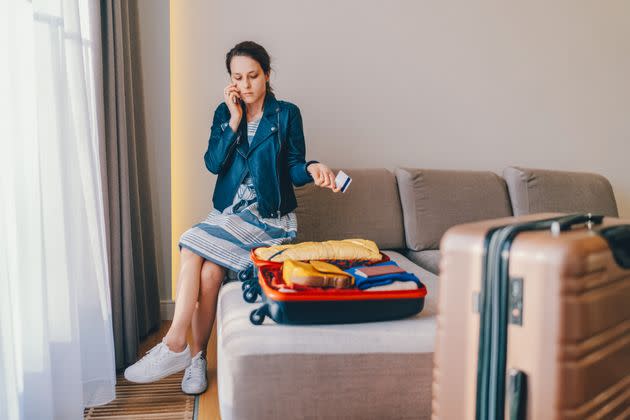Here’s How AI Can Find You Cheap Flights And Hotel Deals
7 min read
Many unexpected events can derail a relaxing vacation, but one of the most violating experiences is falling victim to a scam.
“Scams can come in all forms, especially as the use of technology increases,” Julian Moro, the senior vice president and regional security director at the company International SOS, told HuffPost.
In June, Booking.com’s safety team said that there had been “anywhere from a 500 to a 900% increase” in travel scams over the prior 18 months, and pointed to the rise of artificial intelligence as a primary driver.
“I believe there has been an uptick in scams since the COVID pandemic ended. And it’s mostly due to the sophistication of email and website travel scams, where the emails and websites for many are harder to determine if they’re genuine or not,” said Ned Levi, a columnist and travel scam expert with the nonprofit Travelers United.
To help travelers avoid falling into these traps, HuffPost asked experts to share their top tips for eluding scammers during vacations.
Look up common scams in your destination.
“There are many typical scams that are still out there ― long indirect routes in taxis, ‘your attraction or lunch venue is closed,’ ‘your hotel is overbooked’ ― but the ubiquitousness of phones, roaming data and easy text translation have put the power back in the hands of the traveler to debunk the scam before being ensnared,” Moro said.
In addition to making use of the internet when something seems fishy, he recommended researching common scams in your travel destination ahead of your trip so that you can be on the lookout.
“If you are carrying a travel guidebook, it will list the most common scams in that specific country,” Moro noted. “Or if you have access to an International SOS program through your employer, you can contact the relevant security team, who will be able to advise you of all the latest and specific scams relevant to the destination.”
Make reservations with reputable vendors.
“To minimize the risk of falling victim to scams, I recommend using reputable websites and vendors for booking and other travel-related services,” Moro said.
From your flight and lodging to your guided tours and attraction tickets, take extra time to check that the travel providers you’ve chosen are legit.
“Read reviews, always opt for reputable accommodations and ensure that all of your safety needs are offered at your accommodations,” Moro said.
If you decide to purchase admission to certain attractions at the door, go straight to the ticket office.
“You should never purchase tickets from someone outside the venue,” Levi said. “In the booking and planning process, travelers should use well-known travel sites and/or a quality brick-and-mortar travel agent.”
Use official channels to communicate and book.
“Ensure all communication is conducted through the official and legitimate app, email thread and phone number,” Moro said.
Indeed, you’ll want to confirm that you’re making bookings through official channels. Levi noted that the “bogus travel website scam” is alive and well.
“You do a search and click on a link, but it’s a fake travel website that will take your credit card payment and never get you the ticket you bought,” he explained.
Advancements in technology like AI have made it more difficult to detect travel scams in recent years.
“We used to recommend that people pay attention to grammar, spelling and tone,” said Ally Armeson, the executive director of programs at the nonprofit Cybercrime Support Network. “Now, with tools like ChatGPT, cybercriminals can easily produce convincing messages, even if they speak a different language.”
Steer clear of deals that seem suspiciously good.
“Watch out for a deal that’s too good to be true,” advised Brittany Allen, who specializes in trust and safety at the digital security company Sift. “If an extremely low price or exclusive deal seems unrealistic, it probably is.”
Travel with a healthy dose of skepticism and an awareness of roughly what things should cost and why.
“We all want a good deal. But if the offer is way below market price, then think again,” said Amy Nofziger, the director of victim support at the AARP Fraud Watch Network. “Scammers will try to entice you with a super low offer.”
Use a credit card to pay for big bookings.
“Consumers should always verify booking sites through reviews and official channels and use secure payment methods,” Allen emphasized.
She warned travelers to be on alert for requests for payment via less secure methods like wire transfers.
“Don’t pay with checks, debit cards or money transfers,” Levi echoed. “Use credit cards because they give travel consumers the most protection if scammed.”
In such a case, paying by credit card makes it more likely that you’ll recoup your money.
“On most scams, once you know you’re scammed, traditional methods aren’t going help unless it’s from a rogue branch of a reputable company,” Levi explained. “But if you’ve used a credit card to pay, you can go back to the credit card company and dispute the charge.”
Avoid unsecured Wi-Fi networks.
“Avoid connecting to public Wi-Fi, especially when it involves logging into accounts that have access to sensitive information, like your bank,” Armeson advised. “It’s best to access these accounts while using your mobile data.”
If a situation requires that you connect to public Wi-Fi to access sensitive information, try to use a virtual private network, or VPN.
“A VPN encrypts your internet connection and hides your IP address, making it difficult for bad actors to track your online activity or intercept your data,” Armeson explained.
Stay vigilant in crowds.
“While traveling, you have to be careful about crowds, which draw in pickpockets, cut-snatch-grab thefts,” Levi said. “You have to be aware of your surroundings. Don’t broadcast wealth. Don’t carry more than one credit card at a time when out and about.”
Keep your most valuable items back at home or safely stowed in your room safe, rather than on your person as you explore tourist areas. When you’re traveling alone, research the safety recommendations around public transportation, different neighborhoods and nighttime versus daytime.
“Remain calm but vigilant in uncomfortable situations, and avoid traveling on foot or by yourself as much as you can,” Moro suggested. “Use hotel transportation wherever possible.”


Establish safety protocols when arranging for drivers.
“Be aware of scammers pretending to be the driver you’ve arranged to meet you at the airport,” Moro said. “They will note down the name they see on someone’s signage, then get closer to the airport baggage exit.”
If a driver will be picking you up from the airport, have their contact name, phone number and a description or photo.
“Agree on a meeting point,” Moro suggested. “Have them display an agreed signage ― typically the emblem or name of their company and an agreed protocol to confirm it’s them. Ask them who they are here to meet, rather than offer your name, for example.”
Document, document, document.
Documentation is your friend when it comes to avoiding scams. Take lots of before-and-after photos of your Airbnbs and rental cars.
“If you rent a car, you’ve got to fully document it before and after you drive the vehicle, inside and out, and you’ve got to document that you’ve returned the car,” Levi said.
In the event that you fall victim to a scam, credit card receipts and email correspondences can help.
“Travelers will need documentation and proof to win, so they’re going to have to be careful when planning, booking and using, and document everything,” Levi said.
Don’t travel without telling someone back home.
In the unlikely event that something goes awry during your travels, you’ll want loved ones to know where you are.
“Give someone at home a copy of your itinerary, and have key contacts on your phone stored safely,” Moro advised.
He also recommended setting up a code word or phrase with your loved ones that you can use in the case of an emergency. This will help combat a scheme that involves scammers using voice technology to call travelers’ family members, make up a fake emergency and ask them to send money immediately.
But resist the urge to tell everyone.
Be mindful of who you tell about your upcoming trip, and consider keeping it off social media until the end.
“Resist the temptation to post about your travels before or during the trip,” Armeson said. “Not only does it let people know you’re away from your home, it also lets cybercriminals know your guard is down in terms of cybersafety.”
Practice good ‘cyber hygiene.’
“Make sure your cyber hygiene is on point before you leave for your trip,” Armeson said. “Use strong passwords, enable two-factor authentication on all of your accounts, review your social media privacy settings, and make sure all of your apps and devices are updated with the latest security patches.”
Try to stay on top of your financial security during your travels as well.
“Regularly review your bank statements to monitor for any unauthorized transactions, as bank and credit card information is likely to be compromised in a scam,” Moro said.
Act fast if something is up.
“If you find yourself in the midst of a physical scam, remain calm, polite, smile and extricate yourself as soon as possible,” Moro advised. “Avoid confrontation — a little grace and humor goes a long way to defusing the situation.”
He recommended reporting scams to local authorities if it feels safe and feasible to do so. Also consider asking for help from staff members at your hotel or hostel.
If you were scammed online, pick up the phone. People with travel insurance should reach out to their provider for guidance.
“If your credit card or banking information is compromised, contact your bank or credit card company as soon as possible to mitigate any potential damages,” Moro added.
You can seek help with resources like AARP’s Fraud Watch Network, which is available even to nonmembers of the organization.


